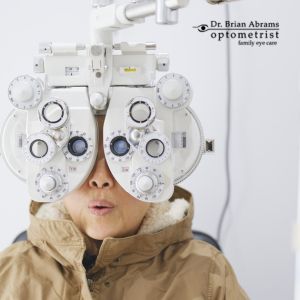Our eyes are our windows to the world, playing an irreplaceable role in experiencing life’s beauty. However, vision impairments that develop overtime like cataracts can cloud our sight and jeopardize eye health. If you’re seeking insights on cataracts and maintaining your visual clarity, professional support and eye exams from an expert optometrist are imperative. Read on for an informative guide on understanding, preventing, and dealing with cataracts by Dr. Brian Abrams, your trusted optometrist in Woodbridge.
What are Cataracts?
Cataracts are a gradual clouding of the eye’s lens caused by protein buildup that diminishes vision over time. They usually develop as a natural aging process, but factors like genetics, lifestyle, and medical conditions can accelerate their formation. As a family eye care optometrist in Woodbridge, Dr. Brian Abrams emphasizes regular eye exams to detect cataracts early. If left untreated, cataracts can lead to loss of sight.

Types of Cataracts
Three types of cataracts are commonly identified based on their location within the eye: nuclear cataracts, cortical cataracts, and posterior subcapsular cataracts.
- Nuclear cataracts form in the central nucleus of the eye’s lens, causing it to harden and yellow gradually. This is the most common cataract type that causes gradual nearsightedness and increased sensitivity to glare.
- Cortical cataracts develop in the lens cortex or the shell layer of the eye lens. It begins as white, wedge-like opacities extending from the lens cortex to the centre. Cortical cataracts can cause blurred vision and difficulties with contrast, depth perception, & glare. People with diabetes are at high risk for developing this cataract type, so regular eye exams are a must.
- Posterior subcapsular cataracts emerge at the back of the eye lens, resulting in blurred reading vision, ‘halo effects’ or glare around lights, and night vision issues. It’s called a subcapsular cataract as it develops under the lens capsule(the small sac that encloses the eye lens). People with extreme nearsightedness and diabetes often develop this cataract that progresses rapidly to impair vision.
Cataract Symptoms & Signs of Progression
- Cloudy or blurred vision
- Increased sensitivity and glare from headlights
- Difficulty in reading, especially the fine print
- Seeing “halos” around bright lights
- Changes in colour perception
- “Double” vision
- Complete vision loss due to untreated cataracts.
Symptoms of cataracts are typically mild at the onset, which means most patients don’t realize that there is a problem developing until it is pointed out by an experienced optometrist in Woodbridge.The best approach to detecting cataracts is with preventative eye exams and diabetic eye exams from a trusted optometrist near you, like Dr. Brian Abrams.
Cataract Treatment Options
In the initial stages of cataract formation, visual aids like glasses, or contact lenses can potentially enhance optical clarity. Sunglasses can also help to prevent further damage from daily UV exposure. However, when the cataract advances to the point of severely disrupting daily living and routine activities like reading & driving, Dr. Brian Abrams may recommend surgery. Your eye surgeon will replace the clouded cataract lens with a clear artificial lens called an intraocular lens (IOL). This highly effective ocular procedure is relatively safe and quick, resulting in improved vision shortly after the surgery. As an experienced optometrist in Woodbridge, Dr. Abrams can assess your condition and recommend the appropriate treatment options.
The Importance of Diabetic Eye Exams
Regular eye exams are vital for people with diabetes who are more susceptible to cataracts. Diabetic eye exams allow your optometrist to monitor your eyes for unwanted changes, facilitating early intervention. Staying proactive about your eye health can help you enjoy a life filled with clear, vibrant visuals.
Dr. Brian Abrams: Trusted Eye Doctor in Woodbridge
If you’re experiencing cataract-like symptoms, contact Dr. Brian Abrams for expert guidance from a knowledgeable optometrist in Woodbridge. Dr. Brian Abrams can determine the severity of your condition and provide personalized eye care solutions to manage cataract progression.


